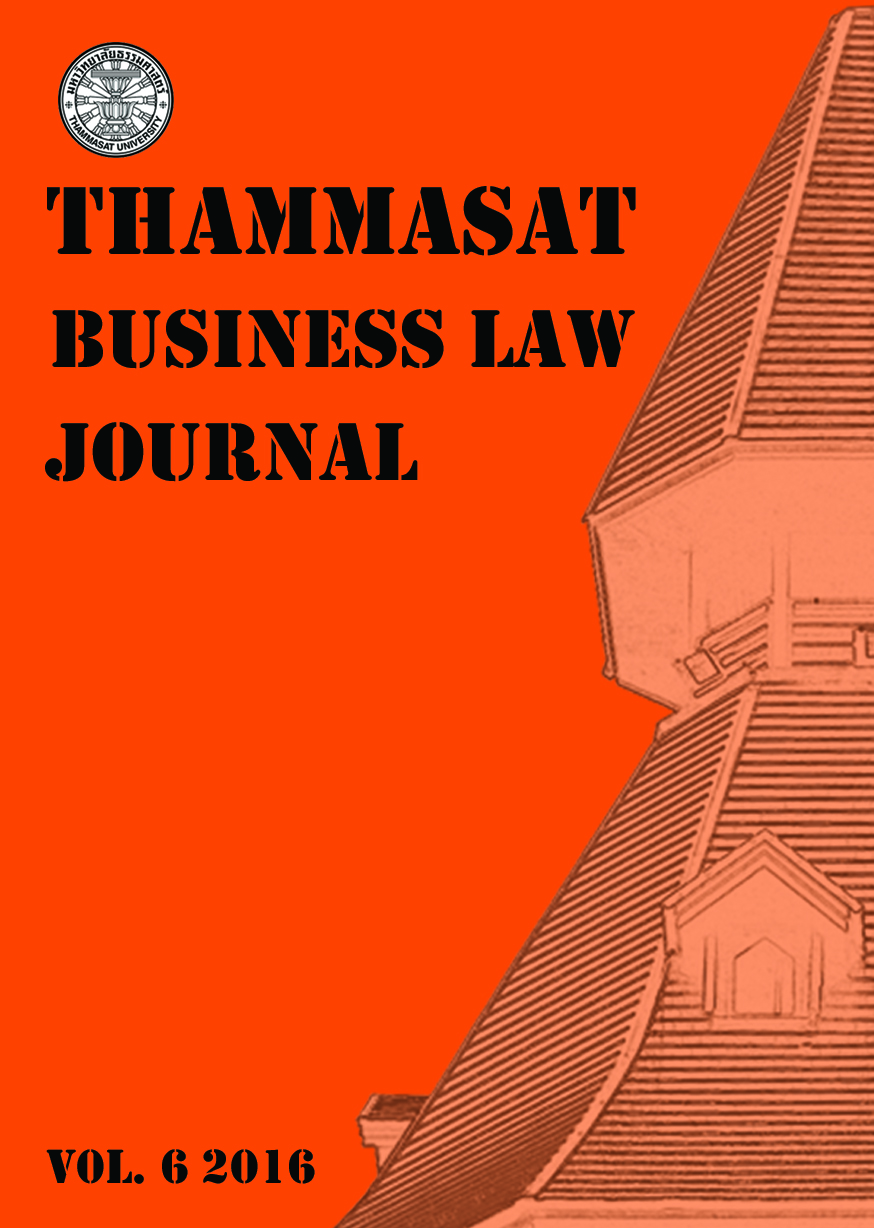PROVISIONAL PROTECTION MEASURES AGAINST COPYRIGHT INFRINGEMENT ON THE INTERNET
Main Article Content
Abstract
Prior to the enforcement of the Copyright Act (No.2) B.E. 2558 Thailand did not have the law related to provisional measures of protection for internet copyright piracy. In case the copyright piracy occurs, the Copyright Act B.E.2537 would be applied.
Understanding the social context, at present, has rapidly changed, technology has played much more crucial role in our daily life, especially the internet access. As a result, the copyright piracy through internet network has been increasing. Therefore, to have the enforcement of technology strategy to protect copyright work, Thai government has stipulated the Copyright Act B.E.2537 amended by Copyright Act (No.2) B.E.2558, coming into force on August 4, 2015. The act has applied the ‘safe harbor’ principles of the United States of America and Europe in drafting as the model, with the purposes of protecting the creators and the initiators of the new works that disseminated through the internet and also in accordance with the internet users’ behaviors.
Section 32/3 has mentioned the setting up of liability limitation of Internet Service Provider(ISP) to protect the internet service providers from risk in being sued in case of copyright piracy. The copyright owners can ask the Court to order Internet Service Provider(ISP) to take down pirated files from their websites whereas the copyright owners has to show enough evidences to the Court. After, the Internet Service Provider(ISP) has followed the Court’s order to take down the pirated file, the Internet Service Provider(ISP) do not have the liability of the pirated action.
In Section 32/3, it was found that the process in suppression of copyright piracy and the protection of copyright of the copyright owners has focused on court procedure which it takes time consume and also has impacts on suppression since technology changed all the time. This leads to overwhelming cases in Court of Justice. In addition, the internet copyright piracy deals with technology where it needs technology expertise and experts to more efficiently solve the problems and provide guidelines than the past.
From the observations mentioned earlier, in the researcher’s point of view, it is noted that the Copyright Act (No.2) B.E.2558 is difficult to put into action and cannot solve the problems of intellectual property infringement and internet copyright piracy. As the result, Thailand will remain the country of Priority Watch List (PWL) according to the Special 301 Report of the United States Trade Representatives.
Article Details
References
อำนาจ เนตยสุภา และ ชาญชัย อารีวิทยาเลิศ. คำอธิบายกฎหมายลิขสิทธิ์. พิมพ์ครั้งที่ 2. หน้า 79 กรุงเทพมหานคร : สำนักพิมพ์วิญญูชน, 2558. (Amnart Nateyasupa and Charnchai Areewittayalert. Description of Copyright Law 2nd ed. Pg.179 Bangkok : Winyuchon Publishing. 2015)
Alain Strowel. Peer-To-Peer File Sharing and Secondary Liability in Copyright Law. Edward Elgar Publishing Limited. 2009
Irini A. Stamatoudi. Copyright Enforcement and the internet. Kluwer Law International Publishing. 2010
Mira T. Sundara Rajan. Copyright and Creative Freedom : A study of post-socialist law reform, Routledge of Taylor and Francis Group Publishing. 2006
Paul L.C. Torremans. Copyright and Human Rights : Freedom of Expression-Intellectual Property-Privacy. Kluwer Law International Publishing. 2004
กรมทรัพย์สินทางปัญญา กระทรวงพาณิชย์. “กฎหมายลิขสิทธิ์ช่วยขับเคลื่อน “Digital Economy” คุ้มครองผู้สร้างสรรค์งานบนอินเตอร์เน็ต กำหนดโทษการละเมิด 10,000 – 400,000 หรือทั้งจำทั้งปรับ.” (2015), The Department of Intellectual Property, Ministry of Commerce (Thailand) “Copyright Law to compel Digital Economy” Protection of the creator in the internet Penalties 10,000-400,000 or in prison or both”. https://www.ipthailand.go.th/index. php?option=com_content&view=article&id=1618:digital- economy-10-000-400,000&catid =8:news&Itemid=332
Makeen Fouad Makeen, “Copyright in a Global Information Society : The scope of Copyright Protection Under Internation, US, UK and French Law” Volume 5
Electronic frontier foundation “Seven lessons from a comparison of the Technological Protection Measure Provisions” https://www.eff.org/pages/seven-lessons-comparison-technological-protection-measure-provisions (Accessed on July 21, 2016)
Heinonline “Notice, Takedown, and the good faith standard: How to protect internet user from bad-faith removal of web” contenthttp://heinonline.org/HOL/ LandingPage?handle=hein.journals/stlpl29 &div=26&id =&page= (Accessed on July 20,2016)
Digital Law Online. “Notice and Take Down and Putback.” (2015), http://digital-law-online.info/lpdi1.0/treatise34.html (Accessed on July 20,2016)
Information Economics and Policy “Supply responses to digital distribution: Recorded music and live performances” http://faculty.chicagobooth.edu/chris. nosko /research/nosko_iep.pdf (Accessed July 24,2016)
(Chalermwut Sriporm. Liability of Web Service Provider for Copyright Infringement. Thesis for the Degree of Master of Law, Faculty of Law, Thammasat University, 2013)


